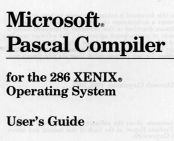 Microsoft Pascal Compiler for the 286 XENIX Operating System User's Guide, part number 8511I-330-05, document number 020-092-013, from 1985. Microsoft Pascal Compiler for the 286 XENIX Operating System User's Guide, part number 8511I-330-05, document number 020-092-013, from 1985. | |
| Original author(s) | Microsoft Corporation |
|---|---|
| Initial release | 1980; 45 years ago (1980) |
| Stable release | 4.0 / 1988; 37 years ago (1988) |
| Operating system | MS-DOS, Xenix, OS/2 |
| Type | Pascal programming language |
| License | Commercial |
Microsoft Pascal is a discontinued implementation of the Pascal programming language developed by the Microsoft Corporation for compiling programs for running on its MS-DOS and Xenix operating systems and, in later versions, on OS/2 (like many other Microsoft programming tools, albeit they are only capable of generating 16-bit programs for the latter).
Overview
Microsoft Pascal version 1.0 was released in 1980. The last version of Microsoft Pascal to be released was version 4.0 in 1988, when Microsoft Pascal was superseded by Microsoft QuickPascal, a cheaper development tool that Microsoft produced in order to compete with Borland's Turbo Pascal.
Microsoft Pascal was priced at $300, whereas QuickPascal was priced between $25 and 50, and the differences between the two were similar to those between Microsoft BASIC Professional Development System and Microsoft QuickBASIC.
Unlike the ISO-compliant Microsoft Pascal product, QuickPascal went after the ultimate compatibility with Turbo Pascal. This included not only source-level compatibility, but rather complete binary compatibility with widely available unit libraries for the competitor's compiler. To achieve this level of compatibility, QuickPascal moved away from the common file format (OBJ) and tool set (LINK, LIB) shared by Microsoft's other compilers.
References
- ^ The Microsoft Archives, By Ben Armstrong, 8 Dec 2004, MSDN Blogs, One of the cool things about working at Microsoft is having access to the Microsoft Archives. It turns out that Microsoft has been quite fastidious about keep record of all product and press releases since the beginning of time. ...In 1980 Microsoft actually released their own PASCAL compiler - this was something that I never knew. This compiler was maintained through to 1988.
- Advert: Microsoft Pascal (version 3.3), Page 162, PC Mag, 29 Oct 1985
- "Microsoft compiler and operating system detailed versions information". Old Software Bought and Sold, EMS Professional software. Retrieved April 13, 2005.
- ^ Product comparison: 4 Pascals for DOS, By John Walkenback, InfoWorld, 12 Sep 1988, Page 57:( Microsoft Pascal)
- "Microsoft Pascal 4.0".
- "Usenet post by Tom Hanlin". Google Groups. Retrieved April 13, 2005.
- Notes
- Jon Udell, Clash of the Object-Oriented Pascals, BYTE, July, 1989.
- M.I.Trofimov, The End of Pascal?, BYTE, March, 1990, p. 36.
| Pascal programming language family | |||||
|---|---|---|---|---|---|
| Dialects |  | ||||
| Compilers |
| ||||
| API | |||||
| Microcomputer | |||||
| Comparisons | |||||
| Designer | |||||
| Microsoft development tools | |||||||
|---|---|---|---|---|---|---|---|
| Development environments |
| ||||||
| Languages | |||||||
| APIs and frameworks |
| ||||||
| Database |
| ||||||
| Source control | |||||||
| Testing and debugging | |||||||
| Delivery | |||||||
This programming-language-related article is a stub. You can help Misplaced Pages by expanding it. |